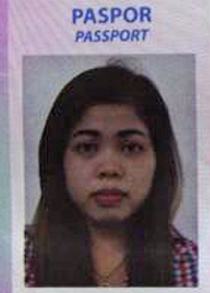It has emerged that suspects involved in the Kim Jong Nam assassination were carrying passports from third countries, neither of which were for North or South Korea. In light of these developments, analysts have noted that North Korea’s terror and murder operations are being increasingly ‘contracted out.’
To avoid direct accusations of North Korean culpability, an increasing number of cases have involved the recruitment of ordinary citizens from third countries to carry out crimes. International condemnation for attacks such as the bombing of Korean Airlines Flight 858 and the assassination of Lee Han Young are likely to have influenced the North Korean authorities to modify their approaches.
A North Korea expert with extensive experience in analyzing the North’s clandestine operations against South Korea spoke with Daily NK on February 17, noting, “North Korea began to hire foreign nationals to commit acts of terrorism and carry out assassination plots some time ago, but in the past two to three years, the strategy has become more common. Since North Korea has been accused of being ‘a state sponsor of terror’ by the international community, the country has started to use this approach to avoid accusations.”
“For contract killings, North Korea tends to hire individuals from Southeast Asia and China. In Southeast Asia, there is an underground market for this kind of work, and making arrangements is relatively easy. Some of the contract killers have extensive experience and are known to be professionals. Even when that is not the case, all it takes is a little bit of money to arrange a murder. No persuasion is necessary,” the analyst continued.
“In terms of finding contract killers in China, it’s easier to hire ethnic North Koreans living in China because they can speak Korean. Not all of the ethnic Koreans in China are supportive of North Korean causes, but a little bit of money is reason enough to motivate a willing pool of candidates for the job.”
A defector with experience working as an international espionage agent for North Korea’s General Reconnaissance Bureau added, “If you want to use North Korean agents to commit a terrorist attack, it is necessary to conceal their identity. The agent needs passable identification documents and to be able to fluently speak the local language. It is much simpler to send these agents to foreign countries under a different pretense so that they can locate and recruit locals to carry out the work on a contract basis.”
“In Southeast Asia, some countries have very low average incomes, so offering a few thousand US dollars is a huge incentive. In the General Reconnaissance Bureau, I remember that foreign agents were handed thousands of dollars as a reward for completing a mission,” the defector continued.
According to the defector, some foreign nationals from third countries have been kidnapped and trained as spies in North Korea before being dispatched back to their home countries to carry out missions, a practice that began in the Kim Il Sung era. Various government agencies have been complicit in carrying out these operations, including a liaison office in the Central Party, an espionage unit called Room 35, and a reconnaissance office in the Ministry of the People’s Armed Forces.
“Young females were kidnapped from abroad and brought back to North Korea for training. Following an indoctrination period, they would be sent back to their home country. Before the General Reconnaissance Bureau was reorganized into its modern form, the liaison office, Room 35, and the reconnaissance office in the army were in charge of these operations. Back then, it was hard to distinguish which agency was responsible for a given international terrorist attack perpetrated by North Korea, but now that the departments have all been merged into the General Reconnaissance Bureau, it’s easy to identify who is responsible,” he said.
With North Korea’s use of contractors to carry out attacks on its behalf, its effective operational reach expands.
A South Korean missionary with experience assisting defectors in third countries added, “While I was in the field, I was nearly killed twice by locals. At the time, I thought they were just trying to rob me because I had never met my assailants before. But now that I look back on it, I think the fact that I did missionary work focusing on defectors probably made me a target of assassination attempts by the North.”
“It’s likely that a significant number of people murdered abroad under unusual circumstances have been victims of North Korean contract killings. As these contract killings become more bold, it will become virtually impossible to remain completely safe from an attack,” the missionary added.
The two young women who have been accused of carrying out the poison attack on Kim Jong Nam were holding Vietnamese and Indonesian passports. These passports do not appear to have been forged, and it has been suggested that the women were given money in exchange for participating in the scheme.
“The assailants are claiming that they believed they were participating in a practical joke, but it is unlikely that anyone in their right mind would play such a dangerous joke on someone. They are most likely spies recruited by North Korea, or contract killers paid for a single job,” a high-ranking defector noted.
When asked why the contract killers used a method that is commonly associated with North Korean attacks and is likely to invite suspicion of a connection, the North Korea analyst said, “They chose to use a method with a low risk of failure.”
“If the regime uses third country nationals to commit an act, they can formally distance themselves from accusations, but if an assassination attempt fails, that brings enormous problems. Guns and knives are not good murder weapons because the chance of getting arrested is significantly higher. Poison is simple but deadly. It’s North Korea’s weapon of choice,” the analyst concluded.





















